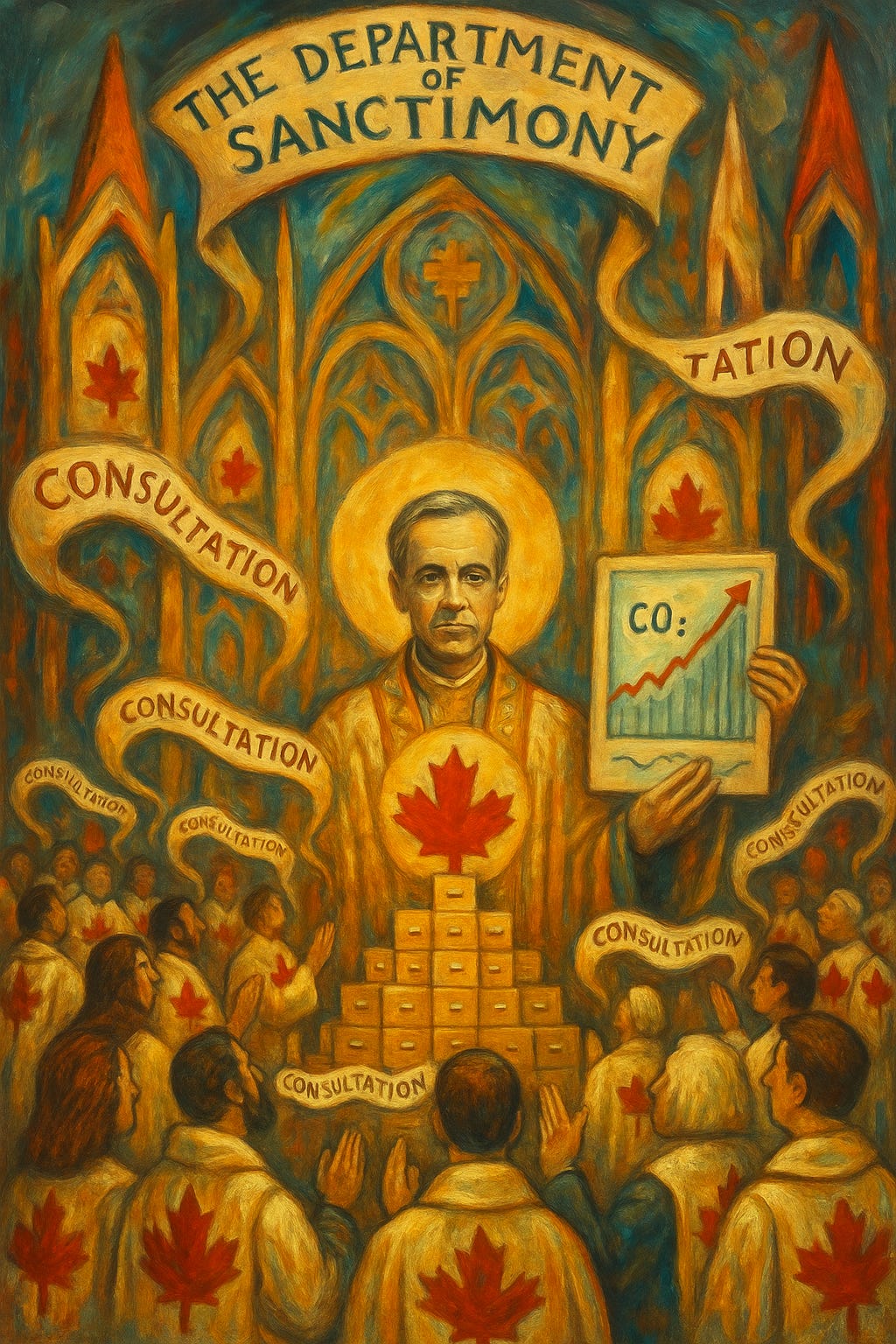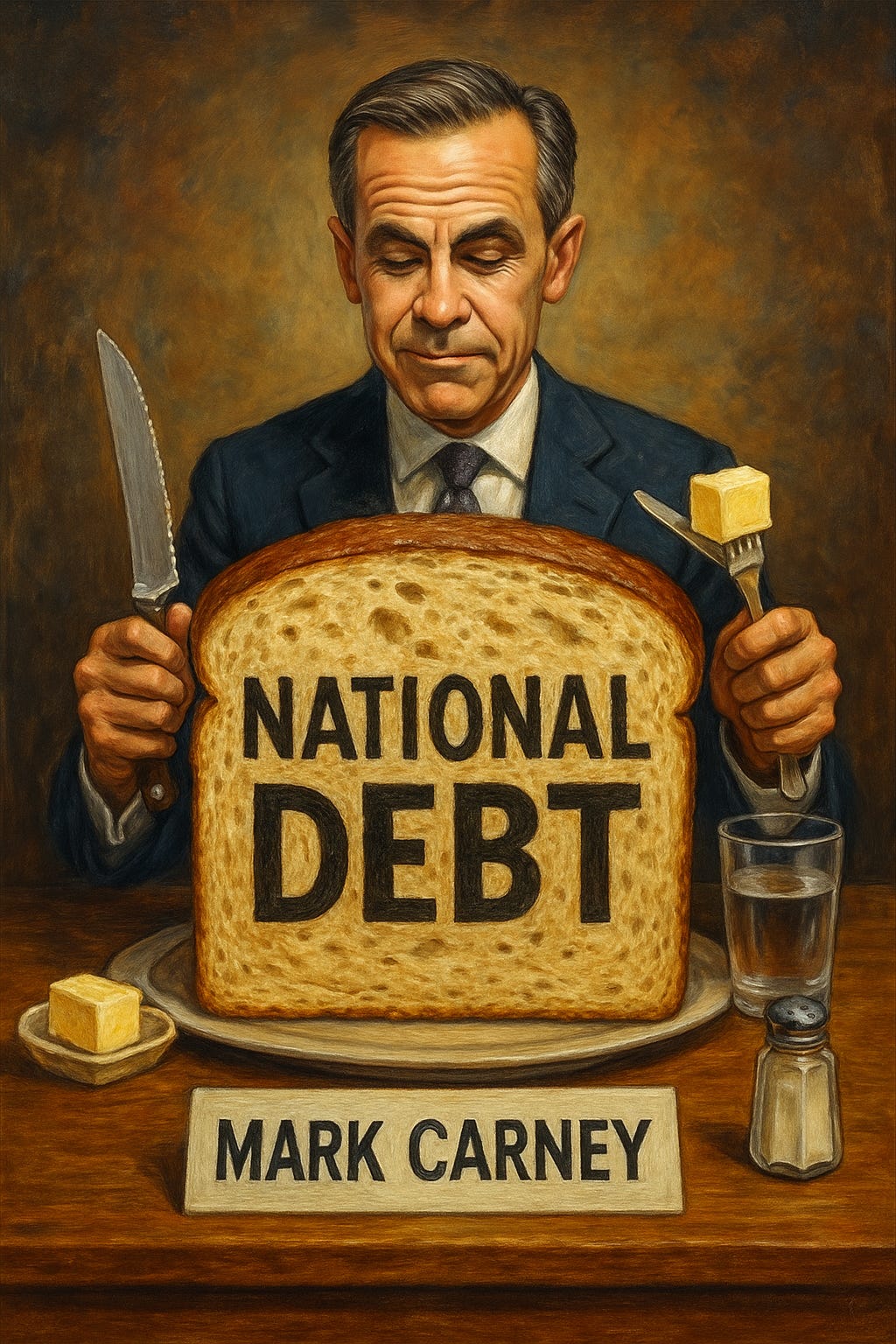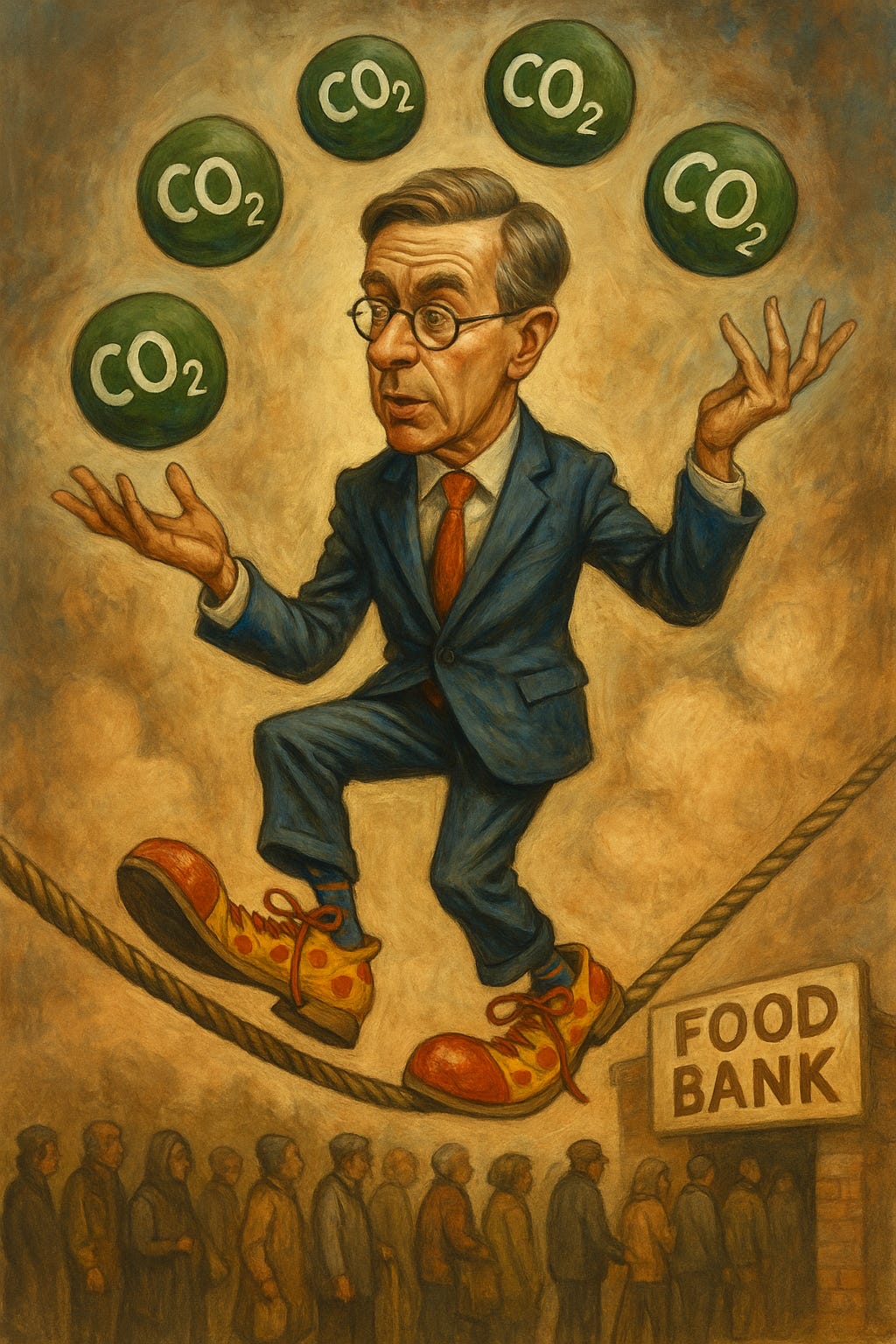A Letter To The Prime Minister
Try fireside talks. Teddy Roosevelt did them, and it seemed to work.
If you believe in free speech, here’s the bad news: it isn’t actually free. It costs $5 a month. That’s less than the latte you complain about, less than the Netflix shows you’ll never watch, and far cheaper than your last regrettable bar tab.
For that, you get three essays a week, open comments, and the satisfaction of knowing you’re funding uncensored writing in a world addicted to censorship. Everyone says, “It’s just a cup of coffee.” Fine. But here’s the pitch: give me your coffee money and I’ll hand you something stronger—essays with bite, arguments with teeth, and the freedom to say what others won’t.
Subscribe today. Because silence is free—and it’s worth exactly what you paid for it.
Rewritten in November 2025.
Note: Fireside chats were a series of informal radio broadcasts delivered by President Franklin D. Roosevelt (FDR) between 1933 and 1944. These broadcasts revolutionised how leaders communicated with their citizens, making complex issues accessible while fostering trust and connection during some of the most challenging times in American history.
Dear Prime Minister Carney:
Please, Take Off the Tie, Put Some Wood on the Fire, and Sit Down
This letter was not written for you. It was written for Pierre Poilievre, who came within a few percentage points of inheriting a weary country’s hope. I had imagined him giving this address on his first night in office — a fireside chat, not to soothe or flatter, but to tell Canadians the truth.
But history, ever fond of irony, intervened. Donald Trump frightened the markets, diplomats, and the delicate classes. And so the electorate, anxious for order rather than energy, turned to you — the calm technocrat, the polished economist, the Davos whisperer. Canadians decided that a banker might negotiate better with a brawler.
And now, here you are: the reluctant saviour, sleeves rolled halfway, elbows up and trousers down.
You speak of fiscal responsibility while standing knee-deep in a deficit swamp. You promise realism but practice ceremony. You are a man of ledgers pretending to be a man of letters.
To be fair, negotiating with Trump is a cruel assignment. His mood depends on what commercials he’s seen, who last flattered him, how warm his Big Mac was, and whether anyone has told him lately that he looks fifty and works out.
But, Prime Minister, your real problem is not in Washington — it is at home.
Because while you strategise about “climate targets,” “sustainable growth,” and “inclusive transitions,” millions of Canadians are strategising about dinner.
Here are a few thoughts from us proles — the citizens whose taxes fund your photo ops — for you to ponder before you light the fireplace and deliver another of your televised lullabies. A real conversation would be a novelty; the country has grown weary of your vapid, self-satisfied bromides, delivered in that tone of tranquillised certitude peculiar to men who have never been contradicted at the dinner table.
Asking you a question is like trying to play tennis against a wall that isn’t flat — all uneven brickwork and jutting angles — the ball never comes back, only ricochets into absurdity. Listening to you speak to the press is rather like listening to Forrest Gump, if Forrest had been stripped of his charm and refitted with a mirror where his empathy should have been.
And do remember, Prime Minister: you are not the CEO of a family firm, nor the sole shareholder in the nation’s fortune. You are the elected custodian of a democracy, not its proprietor — and the country is beginning to notice the confusion.
The Food Bank Line Is the New Parliament
When Canadians line up at the food bank, they are not discussing emissions caps.
They are not fretting about the social cost of carbon or whether solar panels should be domestic or imported. They are worrying about how to buy milk, eggs, and rent in the same week.
In this country of resource abundance — of wheat, timber, gas, and ore — we now have food-bank inflation. It is the most un-Canadian phrase imaginable, and yet, here we are.
Your economists can polish their charts all they want, but the quiet truth is that Canada’s per-capita GDP has declined for over a decade. We are now poorer, in real terms, than we were before 2014. Productivity has been stagnant for fifteen years. By 2050, if trends continue, the average Canadian’s income will be half that of our American neighbours.
And still, your office finds time to lace every speech with hockey metaphors. “We’re backchecking for Canadians.” “We’re skating hard in the third period.” With the Blue Jays now in the World Series, I even heard a baseball pun last week.
Prime Minister, your first budget cut should be to fire whoever writes those lines.
They are not just tired; they are tragic. You are not a man of the people; you are a man of the pension fund. The British, with their unerring ear for irony, would call you posh. And indeed you are.
Throwing on a hockey jersey over a Savile Row suit doesn’t make you relatable — it makes you look like a banker trying to blend in at a pub quiz.
If you truly wish to reach Canadians, try speaking to them as adults, not as sports fans waiting for a locker-room pep talk.
The Illusion of Prosperity
It is one thing to inherit a broken system; it is another to pretend it is functional. You have taken over an economy that has been running on fumes, expensive homes, faith, and borrowed money. Our national debt now exceeds $1.2 trillion, with interest payments surpassing $46 billion a year — almost as much as the federal government spends on health care. Every Canadian now carries roughly $31,000 in federal debt.
We are told, as we always are, that this is “manageable.” So was the Titanic’s speed.
The problem isn’t the math — it’s the morality. Governments for the past decade have treated public money as emotional therapy. Rather than confronting structural decline, they’ve disguised it with subsidies, credits, and slogans. Green Transition. Affordable Housing Plan. Innovation Fund. Each of these has become a euphemism for postponing adulthood.
You, Prime Minister, were meant to bring discipline to this madness. Instead, you’ve become its latest accountant.
Hubris Dressed as Humility
There is something almost touching about your faith in technocracy. You still believe that if the right people — the credentialed, the serious, the well-tailored — simply hold the right meetings, the economy will correct itself. But Canada’s decline is not a spreadsheet error; it is a crisis of philosophy.
Our national leadership has been captured by a kind of managerial vanity — the delusion that confidence and vocabulary alone equal wisdom. You mistake verbosity for depth. Your speeches often sound as if a committee of PowerPoint slides has written them.
And while you reassure Canadians that “everything is under control,” families are watching their mortgages renew at higher rates, their children move home, and their grocery carts shrink. Inflation has been “managed” in the same way a fire is “managed” by blowing on it.
Climate Cathedrals and Cold Kitchens
Here is the cruel paradox of your leadership: you speak endlessly about climate policy in a country that can no longer afford heat.
I do not deny the moral importance of stewardship. But your approach to climate change has become a theology rather than a policy. Canada produces 1.5% of global CO₂ emissions. Even if we vanished tomorrow in a puff of recycled virtue, the planet’s thermostat would not move.
Yet, to reduce that negligible figure, you are prepared to strangle the very sectors that sustain the nation. We have shuttered refineries, cancelled pipelines, and turned resource towns into museums of unemployment.
The only reliable way to reduce CO₂ is to scuttle an energy-intensive economy — to make it poorer, smaller, and less ambitious. That, Prime Minister, is precisely what you are doing, even as you insist you are “investing in the future.” Big projects? Or just another big bureaucracy to tell us why we can’t do them?
For the professional climate caste—the academics, consultants, and grant-funded NGOs—this is wonderful news. The apocalypse is their career. But for everyone else, it’s a slow suffocation disguised as virtue.
You have built an entire economy around guilt: carbon guilt, consumption guilt, heating guilt. It is a religion without redemption, a sacrifice without salvation. And in this new catechism, the oil worker is the heretic, the miner is the sinner, and the bureaucrat is the saint.
The Numbers Beneath the Sermon
Let’s be empirically honest. According to the International Energy Agency, global CO₂ emissions hit 37.4 billion tonnes in 2023, a record high—Canada’s contribution: 560 million tonnes — barely 1.5%. China alone added almost 500 million tonnes last year.
Ah, yes, your green oil — that immaculate substance born of your moral imagination, pumped from the ground by angels and refined by guilt. You speak of “decarbonised oil” as if it were a new element on the periodic table — invisible, odourless, and ethically pure.
You have turned petroleum into a sacrament: carbon without sin, combustion without consequence. One half expects you to unveil a barrel labelled Virtue Grade Light Sweet Crude, blessed by economists and approved by Greenpeace. You seem to believe, sincerely and serenely, that if you wrap a pipeline in sufficient penance, it will ascend to heaven instead of the refinery.
But oil is oil, Prime Minister.
You cannot moralise a molecule. Your “green barrels” are a theological artefact — a sermon disguised as strategy, a homily in a hard hat, proof that even bankers can still believe in miracles.
To imagine that our self-imposed impoverishment will alter the climate’s trajectory is statistical narcissism. But to pursue it anyway — to impose energy austerity on a freezing nation for the sake of symbolic purity — is moral cowardice.
A government serious about both the planet and prosperity would be exporting liquefied natural gas to Europe, replacing coal, reducing emissions globally, and enriching Canadians locally. But that would require offending the climate clergy — and Ottawa has never been known for bravery when sermons are available.
A Country That Refuses to Grow Up
For too long, Canada has behaved like a 33-year-old living in his parents’ basement — earnest, articulate, and chronically allergic to reality. We talk about “innovation” while punishing risk. We speak of “diversity” while enforcing conformity of thought. We romanticise modesty while mistaking it for mediocrity.
We are a nation that holds leadership conferences and then elects managers.
You, Prime Minister Carney, could have been the exception — the adult in the room. But so far, you’ve chosen to be its most elegant adolescent. Your government speaks of “reimagining capitalism” while refusing to engage with its first principle: you cannot distribute wealth that has not been created.
Your climate plans, your “inclusive growth models,” your endless consultations with the “private sector partners” — all of it amounts to a polite suffocation of enterprise. Canada’s energy sector, the engine of national prosperity, has been treated like a criminal on parole: allowed to exist, but never trusted, never forgiven, never free.
On Deficits, Debt, and Delusion
You will not pay the debt you now defend. It will be paid by the nurse in Regina, the plumber in Red Deer, the teacher in Halifax — and their children. Milton Friedman once said, “There is no such thing as a free lunch.” You’ve turned it into a seven-course tasting menu.
In the 2024–25 fiscal year, public debt charges are projected to consume over 10% of federal expenditures. Every dollar spent on interest is a dollar stolen from hospitals, housing, or defence. And the interest is compounding. The Bank of Canada’s battle against inflation — much of it caused by your predecessors’ fiscal gluttony — has made that interest more expensive.
You speak often of “resilience,” but resilience is not a line item; it’s a habit. A country that borrows to survive ceases to be resilient. It becomes dependent.
The Abandonment of the North, the Farce of Defence, and the Fat of Bureaucracy
You like to speak of “Canadian sovereignty,” Prime Minister, but a sovereign that cannot defend itself is merely a tenant of history.
For decades, we’ve wrapped our insecurity in sanctimony, congratulating ourselves on being peacekeepers while our peacekeeping capacity rusted in storage. The Americans, exhausted by our moral sermons and surplus virtue, finally read us the riot act. After years of lectures from Ottawa about “soft power” and “inclusive deterrence,” Washington lost its patience. The U.S. Defence Secretary, in unusually blunt language, told your predecessor that Canada was failing its allies and freeloading on their arsenals.
And so, chastened and cornered, you have now promised to spend 5% of GDP on national defence — a pledge so ambitious that even NATO blinked. It was meant to signal seriousness, but it landed like a parody. How will we fund it, when our fiscal cupboard is bare and our procurement process moves more slowly than the glaciers we can no longer defend?
You have inherited a military still armed with the moral confidence of a sermon and the equipment of a museum. We have CF-18s older than some of their pilots, submarines that are more theatrical than functional, and an Arctic patrol fleet that spends more time in dock than on ice.
We have, as one senior NATO official quipped, “weaponised sanctimony and WWII surplus.” Okay, I made that up.
You promise to “modernise,” but modernisation means nothing without morale. The world’s democracies are rearming; Canada is still holding conferences about procurement ethics and sustainable helmets.
You cannot hashtag your way to deterrence.
Thomas Hobbes wrote that “the office of the sovereign consists in procuring the safety of the people.” You have mistaken safety for sentiment. You issue statements instead of ships, slogans instead of steel.
And yet, there is a deeper irony. Even if you found the money to meet this defence target, the bureaucracy charged with spending it would absorb half of it in “consultations.”
The Bureaucratic Leviathan
Here lies the second front of your quiet war against reality — the Canadian civil service, now swollen to a size that would make the old Soviet ministries blush. Nearly one in five working Canadians draws a government paycheque. It is not a civil service; it is a voting bloc.
The problem, however, is not just arithmetic. It is structural rot. In Ottawa, ten people are doing the work of three, and if you lay off seven, the remaining three will insist on working from home. Productivity has become a performance art, measured in logins, Zoom fatigue, and passive-aggressive emails about “mental load.”
You cannot fix this by trimming. You must amputate.
Cutting a few thousand here or there will change nothing; the machine will simply regenerate its paperwork. We need to abolish departments, not positions. You could do as Chrétien once did — make the provinces the villains of austerity, transfer the obligations, and let them wield the axe. It was cynical, but it worked.
We cannot sustain a federal architecture that now employs more people to administer programs than to deliver them. We cannot pretend that 20% of the workforce existing to regulate, consult, and report on the other 80% is a viable growth model. Bureaucracy, once the servant of democracy, has become its master.
And it votes — reliably, comfortably, and always for more of itself.
You are fond of saying that “Canada must invest in its future.” I suggest we start by divesting from its past — the empire of forms, committees, and consultants that has turned government into a jobs program for the credentialed.
Can we stop using the word “invest” instead of “spend”?
We are not 10.
If you truly wish to defend Canada, Prime Minister, begin by defending it from its own paperwork.
The Opportunity Cost of Pretending
Every dollar you spend subsidising inefficiency is a dollar not spent on medicine, housing, or infrastructure. You are not redistributing wealth; you are redistributing failure.
Our health-care system, the secular cathedral of Canadian identity, is collapsing under its own sanctimony. Wait times for basic surgeries and diagnostics are now among the longest in the developed world. To mention private partnerships is treated as heresy, even as the system quietly depends on them.
And yet, you persist in the fantasy that noble intentions can replace effective action. The road to hell, Prime Minister, was not only paved with good intentions — they financed it. It may be a provincial mandate, but your party have never had any issue in the past with telling the provinces what to do.
Of Vanity and Moral Posturing
Canada’s greatest myth is its own modesty. We imagine ourselves as humble, but our politics are drenched in self-congratulation. We are not smugly moral because we are moral; we are moral because it is cheaper than being competent.
You, Prime Minister, have mastered this art — the performance of empathy as policy. You speak of “shared values” while governing through fear of offence. You host panels on “disinformation” while ignoring the real disinformation: the claim that government can replace courage with consultation.
We are drowning in adjectives and starving for nouns.
Freedom, Responsibility, and the Return of the Adult
It is time to speak plainly. A government that infantilises its citizens cannot claim to lead them. Free speech, free enterprise, and free thought are not boutique rights to be balanced against sensitivities. They are the foundations of a grown-up society.
The previous government flirted with censorship; yours will be tempted to refine it. Resist that urge. A thin-skinned democracy is one that no longer believes in itself.
Justin Trudeau once called Canada a “post-national state.” You, Prime Minister Carney, seem intent on proving him right. But a nation without a core identity is not enlightened — it is unmoored.
To be Canadian should mean something more than being polite at the edge of history.
A Fireside, Not a Stage
You are a man who understands numbers but not narrative. So let me offer you both.
Canada is now the 17th-richest country per capita in the OECD. Our productivity ranks among the lowest in the G7. We spend billions on clean-tech subsidies while importing batteries and turbines made in Asia by coal-fired plants. We call it progress.
Meanwhile, the people are cold. The grocery bill rises, the dream of home ownership evaporates, and the middle class you claim to defend is being taxed into the working poor.
If you truly wish to emulate Roosevelt, remember that his fireside chats were not marketing. They were moral confrontations — a leader telling his people that he trusted them enough to hear bad news.
Try it. Tell Canadians the truth: that you cannot heat homes with hashtags, cannot build prosperity out of paperwork, and cannot inspire confidence with clichés.
And please — fire the speechwriter with the hockey puns.
A Final Word by the Fire
When people are in line at the food bank, they are not thinking about CO₂ levels or GDP growth. They are thinking about dignity.
You have been given power, Prime Minister, not as a birthright but as a loan from the exhausted. If you continue governing as if the economy were a simulation and the people a dataset, the loan will be recalled — with interest.
The fire is yours now. Use it to warm the country, or watch it burn.
Respectfully,
Paul Finlayson
Citizen and reluctant optimist
If you found value in this article and wish to support my ongoing work, please consider leaving a tip. Your support helps me continue producing uncensored content on critical issues.







Nice one. I always thought it was Heinlein who coined the “TANSTAAFL” (there ain’t no such thing as a free lunch) principle, not Friedman. The bit about interprovincial trade barriers is a particular bugbear of mine, as the entire purpose of Confederation in the first place was for free trade between the provinces, and they’d no sooner signed the agreement than the premiers started dicking around, and they’ve been dicking around ever since, to the point that internal tariffs-call it what they really are- are already equal to Orange Man Bad’s threatened 25%, and that’s not including supply management.